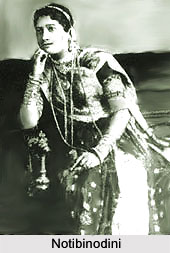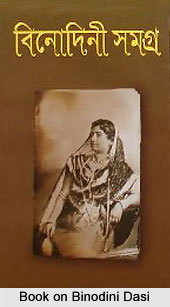 Binodini Dasi was born in Kolkata in the year 1863. She was the first celebrated actress of Bengali theatre, and one of the all-time greats as well who walked the path of Bengali theatre. She was born in the red-light district of Kolkata, and was a prostitute until Grish Ghosh (who became her mentor later on in life), brought her to the mainline Bengali theatre.
Binodini Dasi was born in Kolkata in the year 1863. She was the first celebrated actress of Bengali theatre, and one of the all-time greats as well who walked the path of Bengali theatre. She was born in the red-light district of Kolkata, and was a prostitute until Grish Ghosh (who became her mentor later on in life), brought her to the mainline Bengali theatre.
Life of Binodini Dasi
Binodini Dasi, also known as Nati Binodini in the cultural society, is a famous theatre personality. In keeping with her occupation she was apprenticed to Ganga Baiji for training in music. She first appeared on stage even before her teens in Shatrusamhar i.e. "Slaying the Enemy" on 2 December 1874 at the Great National Theatre. Her acting career spanned barely twelve years, ending with Bellik Bajar i.e. "Bazaar of the Impudent" in 1st January 1887 at Star Theatre. However, she performed in more than ninety roles in eighty plays on all the major stages of her time. Some of the important names can be mentioned as the National, Great National, Bengal, and Star. She virtually sacrificed her personal resources to fund a playhouse to be named after her. But her comrades designed otherwise and christened it the Star Theatre, completely negating her hopes. She left theatre perhaps out of this disillusionment, severing all active connection with it.
She was equally proficient in serious as well as comic plays, Puranic roles i.e. Sita, Draupadi, Radhika, Satyabhama, Chintamani, and fictional ones such as Kanchana, Kamini, Ayesha, Asmani, Kapalkundala, Bilasini, Rangini. Her virtuosity was amazing. She was equally good in all the challenging roles. She acted as six characters in one production such as Pramila, Baruni, Rati, Maya, Mahamaya, Sita in Meghnadbadh i.e. "Killing of Meghnad" in 1881. There was another instance as three in another namely Ayesha, Tilottama, Asmani in Durgeshnandini i.e. "Chieftain`s Daughter" in 1876. Both of them were dramatized by her mentor Girish Ghosh. The wide range of her interpretations in diverse roles testifies to her abilities. Most of the roles were almost contrasting. Some of them are Kunda in Ghosh`s dramatization of Bankim Chandra Chatterjee`s tragic Bisha-Briksha i.e. "Poison Tree" and Kanchan in Dinabandhu Mitra`s satirical Sadhabar ekadashi i.e. "Wife`s Widowhood Fast", the godly Chaitanya in Chaitanya-lila, i.e. "Chaitanya`s Miracles" and the sophisticated Bilasini in Bibaha-bibhrat i.e. "Marriage Muddle". She also acted as the transformed Chintamani in Bilwamangal and the lighter Rangini in Bellik bajar. All of these were directed by Girish Ghosh. Intellectuals of her time such as Chatterjee, Father Lafont, Edwin Arnold, Colonel Alcott, etc. unanimously praised her acting. In 1884, Sri Ramakrishna came to see a play and visited Binodini backstage afterwards. This was an event, which left a deep impression on the actress who became an ardent devotee of Ramkrishna. In her time she was called the Flower of the Native Stage and the Moon of the Star Theatre. She introduced the modern techniques of stage make-up blending European and indigenous styles, at a time when there was no role model before her.
in Meghnadbadh i.e. "Killing of Meghnad" in 1881. There was another instance as three in another namely Ayesha, Tilottama, Asmani in Durgeshnandini i.e. "Chieftain`s Daughter" in 1876. Both of them were dramatized by her mentor Girish Ghosh. The wide range of her interpretations in diverse roles testifies to her abilities. Most of the roles were almost contrasting. Some of them are Kunda in Ghosh`s dramatization of Bankim Chandra Chatterjee`s tragic Bisha-Briksha i.e. "Poison Tree" and Kanchan in Dinabandhu Mitra`s satirical Sadhabar ekadashi i.e. "Wife`s Widowhood Fast", the godly Chaitanya in Chaitanya-lila, i.e. "Chaitanya`s Miracles" and the sophisticated Bilasini in Bibaha-bibhrat i.e. "Marriage Muddle". She also acted as the transformed Chintamani in Bilwamangal and the lighter Rangini in Bellik bajar. All of these were directed by Girish Ghosh. Intellectuals of her time such as Chatterjee, Father Lafont, Edwin Arnold, Colonel Alcott, etc. unanimously praised her acting. In 1884, Sri Ramakrishna came to see a play and visited Binodini backstage afterwards. This was an event, which left a deep impression on the actress who became an ardent devotee of Ramkrishna. In her time she was called the Flower of the Native Stage and the Moon of the Star Theatre. She introduced the modern techniques of stage make-up blending European and indigenous styles, at a time when there was no role model before her.
Later Life of Binodini Dasi
Her autobiography, Amar Katha (My Story) was published in 1913. This autobiography is a landmark not only in the corpus of books on Bengali theatre, but also as a woman`s memoir recounting the prevailing state of Bengali theatre in the middle and late 19th century. Besides offering an insight into the green-room history of the Bengali stage during its formative years, it reveals Binodini`s finer sensibilities in theatre, her range of understanding, and study in the art of acting. Girish Ghosh, her tutor in the thespian arts, paid handsome tributes to her in his preface. Binodini`s autobiography named "Amar Kotha" is written in an elegant style and here she describes the men and women who taught her, exploited her and loved her. After her retirement she went to live with her protector and helper for whom she retained high regard. In her later days she lived a quiet lonely life in Kolkata. In the year of 1941 she died very quietly.




